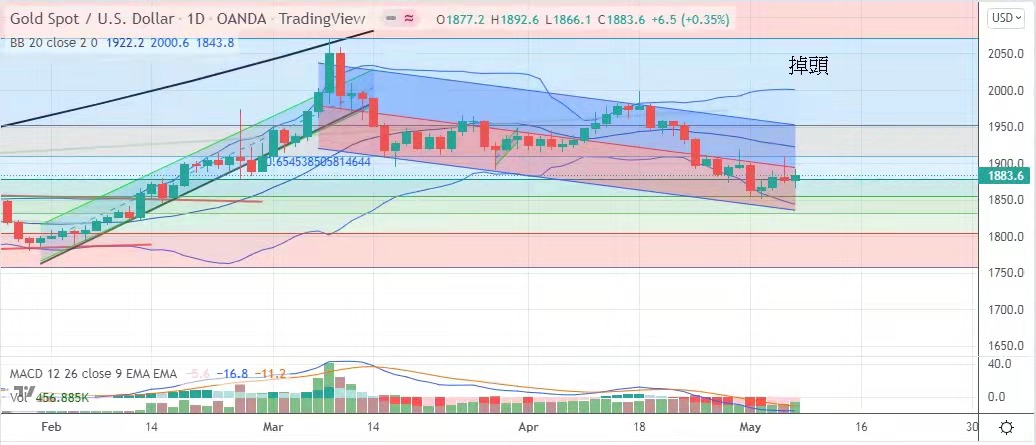Putin's choice
May 9th
Today's volatility range:
The crisis still exists in Eastern Europe. Although the situation seems to be gradually tilting towards the western countries, Putin's choice on the "Great Victory Day" on May 9th will determine the length of the war. Russia's war in Ukraine inevitably produced side effects,
While the supply of natural resources is decreasing, the high prices of crude oil and natural gas have led to a serious deterioration of the global inflation problem, which has forced global central banks to consider raising interest rates to control inflation. The level of interest rate
Reflecting the cost of holding gold, it is inevitable that the price of gold will be suppressed when interest rates are rising. The market is gradually digesting the factor of interest rate increase in the United States, and the price of gold is under great pressure when interest rates rise, which is expected to go down this week.
There is still a good chance. Russian President Vladimir Putin's statement during the parade in Red Square today may make the volatility of the gold market bigger; The suggested volatility today is $1,864 to $1,904.
Senior investors generally have an unscientific but almost true saying about Hong Kong stocks, that is, "Five poor, six unique, seven turn over! 」; In the first week of May, the Hang Seng Index fell to the edge of 20,000 points. Yinjin
Due to the epidemic situation in the Mainland, Fitch, a credit rating agency, lowered its forecast of economic growth in the Mainland, reducing China's economic growth to 5.3% this year. However, the service industry data in the Mainland did not perform well, and the Hong Kong Monetary Authority followed last week.
The United States stepped up its interest rate hike, and announced that it would raise the benchmark interest rate to 1.25%, with immediate effect. Hong Kong stocks were under pressure, and the Hang Seng Index hit 3.81% hard on Friday, closing at 20,002 points, down 1,087 points in a week. investment
Concerned about the development of the Russian-Ukrainian war, Germany is no longer opposed to the EU sanctions prohibiting the import of Russian energy, and is actively developing clean energy, hoping to reduce its dependence on Russian natural gas, while EU leaders will be in the world.
Work on Russia's energy embargo last week,
On the other hand, Russia insists that other countries must settle the natural gas purchased from Russia in rubles, or cut off the supply. Poland and Bulgaria have been the victims of Russia's interruption of supply before, and Finland also refused last week.
Russia's demand has caused natural gas and crude oil prices to rise again, and the economic situation has also been negatively affected by inflation. In addition, the Bank of England raised interest rates again last week, raising the benchmark interest rate to 1%, highlighting Eurolink.
The severity of the inflation problem, coupled with the 0.5% interest rate increase announced by the Federal Reserve, put the risk market under pressure. In a week's summary, the three major European stock markets fell across the board, with the German DAX index falling by 3.01%; Paris CAC index fell by 4.22%;
Britain's FTSE 100 index fell 2.08%.
During the week when the US Federal Reserve held interest rate talks, the US stock market fluctuated like a roller coaster ride. Last Wednesday, the Federal Reserve raised interest rates by 50 points. Powell, the chairman of the Federal Reserve, said that he had not considered raising interest rates by 75 points at a time and indicated his intention.
In the next two meetings, it is possible to raise interest rates by 50 points each, which will stimulate U.S. stocks to rise by more than 3% as soon as possible. However, according to market measurement, the official interest rate of the Federal Reserve will exceed 2.5% this year due to worsening inflation.
The yield of bonds rose by nearly 3.16%, the highest since 2018. The U.S. stock market opened wildly, and the three major stock indexes on Wall Street fell by 3 to 5%. Calculated in a week, the Dow index still fell by 0.24%; The S&P 500 index fell 0.61%; Nas
The Nasdaq Composite Index fell by 1.54%.
On the eve of the interest rate hike, investors became cautious early last week, and the gold price hit a low of $1,850.5 last week. As expected by the market, the Federal Reserve announced a 0.5% interest rate increase on Wednesday, and Federal Reserve Chairman Powell made it clear that there was no "positive consideration"
After raising interest rates by 75 basis points, the market was pleased that the cost of holding gold was lowered, and the price of gold once rose to $1909.8, but then the market predicted that it would be difficult for the Federal Reserve to guarantee that the official interest rate would stop at the end of the year when inflation worsened.
At its so-called neutral interest rate, the yield of 10-year U.S. Treasury bonds rose to its highest level in nearly five years, and the price of gold turned downward, finally closing at $1,883.6. After a week's summary, the price of gold fell by $13.4.
For detailed analysis and operation suggestions, please CLICK the following link to join the group and ask the administrator.
https://t.me/mingtak
Previous Article Next Article


 Whatsapp
Whatsapp Telegram
Telegram

